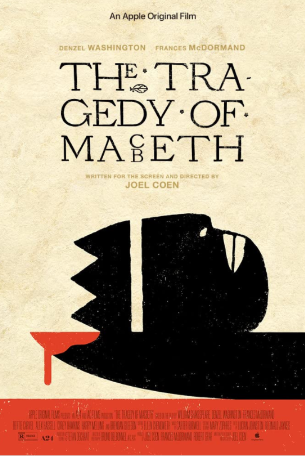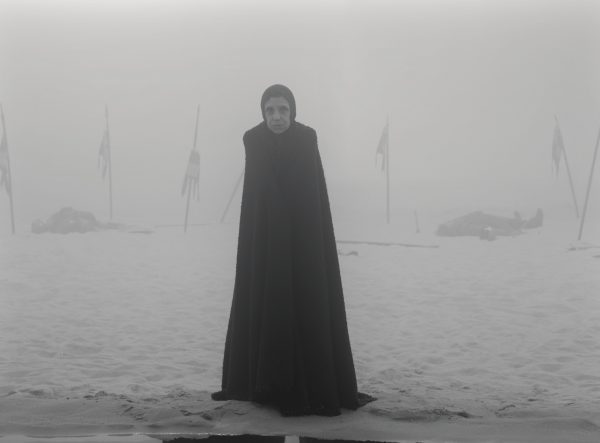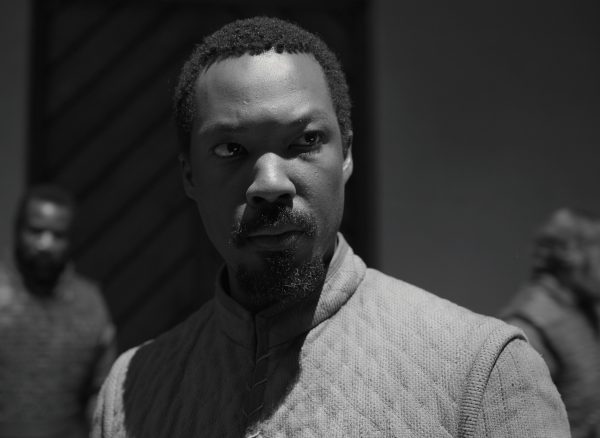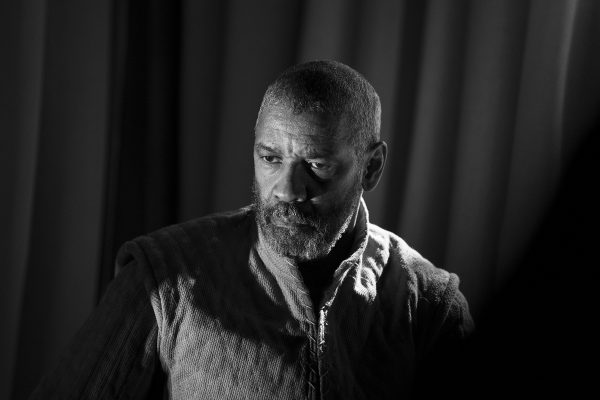

“The Tragedy of Macbeth” (2021). Cast: Denzel Washington, Frances McDormand, Brendan Gleeson, Corey Hawkins, Kathryn Hunter, Bertie Carvel, Harry Melling, Moses Ingram, Ethan Hutchison, Miles Anderson, Alex Hassell, Matt Helm. Director: Joel Coen. Screenplay: Joel Coen. Play: William Shakespeare, The Tragedie of Macbeth. Web site. Trailer.
Getting ahead in life is certainly admirable, but what happens when that drive gets seriously out of hand? Can we stifle the mayhem that’s sure to result? That’s especially problematic when the fate of a nation and its leadership are at stake. Such is the case in the latest film adaptation of a timeless classic, William Shakespeare’s “The Tragedy of Macbeth.”
As one of Shakespeare’s best-known works, it’s hard to believe that there’s anyone who’s not already familiar with the plot of this tragic saga. Having been presented countless times on stage and screen, with roughly 30 movie versions in one form or another, this timeless tale has established itself as one of the most notable works in literary, theatrical and cinematic history. Nevertheless, for the benefit of the uninitiated, here’s what has made this story so enduring.
Having recently defeated the allied forces of Ireland and Norway in a failed attempt to attack their native Scotland, two of the homeland’s distinguished generals, Banquo (Bertie Carvel) and Macbeth, the Thane of Glamis (Denzel Washington), are praised for their bravery and fighting skills. As they make their way home to receive their accolades from Scottish sovereign King Duncan (Brendan Gleeson), they encounter a trio of witches, one of whom (Kathryn Hunter) imparts three prophecies. The enigmatic seer tells Macbeth that he will soon receive a new title and, subsequently, become King of Scotland. Banquo, meanwhile, learns that he will not assume the throne but will one day become the father of a lineage of future Scottish kings.
The duo then leaves to continue their journey, skeptical about what they just heard. However, before long, they encounter Ross (Alex Hassell), another Scottish nobleman, who informs Macbeth that he has just been named the Thane of Cawdor, a revelation thereby affirming fulfillment of the first prophecy. With this information, Macbeth gives new credence to the prophecies and begins musing about the possibility of becoming king, though uncertainties linger.
Upon arrival at the court of King Duncan, Macbeth learns that the monarch plans to visit him at his castle, Inverness. Macbeth believes that the new title and royal visitation stand him in good stead with the sovereign; as a kinsman of the king and his recent good fortune, he believes he’s in line to become heir apparent. However, Macbeth then learns, much to his dismay, that Duncan has named his elder son, Malcolm (Harry Melling), as his successor.

The aspirant royal is quietly enraged at the decision but is still not entirely sure how to proceed. He soon changes his mind, however, when he tells his wife, Lady Macbeth (Frances McDormand), about the witches’ prophecies and recent developments. Macbeth’s determined, headstrong spouse has no reservations about her husband pursuing his destiny, and she shames him into action when she challenges his will to succeed. Upon Duncan’s visit, she urges Macbeth to murder the king in his sleep and put the blame on his personal chamberlains, a frame that initially holds up. Duncan’s death also prompts Malcolm and his younger brother, Donalbain (Matt Helm), to flee to England in fear of their lives, both as potential targets for murder and as suspects in their father’s demise. And so their hasty departure leaves the door open for Macbeth, as one of Duncan’s kinsmen, to ascend to the throne.
Despite Macbeth’s apparent “success,” his plan soon begins to falter, especially with the arrival of Macduff, the Thane of Fife (Corey Hawkins), at Inverness. Suspicions arise, forcing Macbeth into a string of heinous acts to maintain his cover story. But, to complicate matters further, Macbeth and his wife begin seeing apparitions and having hallucinatory experiences that play on their guilt. Ambition, it seems, has started to get the better of them, leading the illegitimate monarch down a path of tragedy even greater than the atrocities he and his spouse have already committed.
Most of us would likely agree that ambition is truly a virtue, one to which we all seek to aspire. However, when left unchecked, it can readily get out of control. And, in many instances, there’s often a fine line between what would be considered legitimate determination and what is looked upon as flagrant, maniacal behavior.
So what’s the difference between the two? It comes down to our beliefs, for they drive how circumstances unfold and, in turn, how our reality manifests. This is the function of the conscious creation process, the philosophy that maintains we tap into these intangible resources in materializing the existence we experience, for better or worse. And, in Macbeth’s case, his beliefs are decidedly geared toward the latter.

Once Macbeth realizes there’s a possibility the witch’s prophecies might come true and learns that he’s not the favorite to become king, he undergoes a shift in attitude, one that percolates into his beliefs. Even though he’s conflicted by uncertainties at the prospect of ascending to the throne, that doubt is swept away when his wife cajoles him into taking action. A new, determined set of beliefs falls into place, providing him with a template on how to proceed. It’s a radical plan, to be sure, but he sees it as a viable option to attain what he wants, and he doesn’t hesitate to follow through on it.
Detestable though they may be, Macbeth’s actions illustrate that conscious creation can make anything possible. But is killing one’s sovereign the wisest course for advancing one’s ambitions? When we pursue such paths as this, we engage in the practice of un-conscious creation, a scenario in which we seek the fulfillment of our aspirations at all costs, regardless of the consequences and with no regard for whatever fallout may ensue. It’s a perilous practice in that we may indeed get what we’re looking for but at a price, one that yields outcomes in a distorted form and rife with unexpected, unintended side effects. This, in turn, often requires the implementation of additional adjustments to make up for those issues, frequently on short notice and drastic in nature. One need only look at Macbeth’s experience after Duncan’s murder to see this at work.
Results like this most often occur when we attempt to “push the Universe.” As our divine collaborator in the conscious creation process, the Universe (or God, Goddess, All That Is or whatever other term best suits you) works with us to bring about the outcomes we have in mind, based on the nature of our beliefs. And those outcomes reflect those intents with remarkable fidelity, right down to the smallest detail, something we should never lose sight of.
In Macbeth’s case, he wants to be king, but that’s an attainment that can be reached in many different ways, again depending on one’s beliefs. The fulfillment of this goal, for example, could be reached by simply waiting for Duncan to live out his life, potentially leaving the door open to Macbeth’s ascendancy upon the sovereign’s death. By contrast, it can also be achieved by the kinds of nefarious means that Macbeth and his wife cook up to bring about the outcome quickly and decisively, but with a hefty set of unforeseen strings attached. And, of course, many other options are available, too, depending on the underlying beliefs involved.
Given the path Macbeth follows, one can’t help but wonder why he and his wife believe they need to follow the course they do. Do they feel a sense of urgency, a need to strike while the iron is hot? Are they afraid that Macbeth’s window of opportunity is fleeting in light of Duncan naming Malcolm as his successor? Or is there some other consideration at work that’s resulted in the abbreviated time table?
Were Macbeth and his wife to open their mind to other possibilities, they might realize that they’re not locked into the path they’ve chosen. For example, given the infinite number of probabilities that conscious creation makes possible, they’re not saddled with the witch’s prophecies as their only option. Those pronouncements represent just one of countless roads open to them. Of course, the strength of their beliefs in that particular possibility dictates what will unfold. And, because of that, this illustrates why we must exercise tremendous care in the beliefs we choose to embrace and what they’re likely to yield, a cautionary tale if there ever were one.


While William Shakespeare’s legendary tragedy has been translated to the screen more times than one can count, this version from director Joel Coen does remarkable justice to the material, especially in technical terms. The film’s stark, exquisite black-and-white cinematography and stylish production design, reminiscent of German expressionism, are positively stunning, suitably complemented by deft film editing and the ethereal score of Carter Burwell. The superb ensemble cast delivers, too, particularly protagonist Denzel Washington and supporting players Corey Hawkins and, especially, Frances McDormand. If I were to find something missing here it would be that the picture isn’t as emotionally engaging as it could have been, with its cold, distant ambiance putting up an often-imposing wall between narrative and viewers. There’s nothing inherently wrong with that, given the filmmaker’s take on this story, but it admittedly keeps the audience at arm’s-length more than some cinephiles may feel comfortable with. Still, the timeless quality of this tragedy nevertheless comes through, making this one of the best cinematic offerings of 2021. The film is playing in limited theatrical release and is available for streaming online.
“Macbeth” has been lavished with praise, especially for Washington’s outstanding lead performance, earning best actor nominations in the Golden Globe, Screen Actors Guild and Critics Choice Award competitions. The film’s superb cinematography has also drawn considerable attention, earning a Critics Choice Award nomination and an award from the National Board of Review, which also bestowed honors for best adapted screenplay. In addition, the picture was named one of 2021’s top films by the American Film Institute and the National Board of Review. Other accolades are almost certain to follow.
When things of a malevolent nature get a foothold in fertile ground, they can grow incredibly powerful, particularly when fed with energy capable of sustaining them. This is true both for tangible items, like pathogens, as well as intangible ones, like beliefs and ideas – which, in turn, can cross over into the corporeal realm and wreak havoc in their various newfound physical forms. It’s at that point when, as the witch observes, “something wicked this way comes.” But the chaos and carnage that can emerge from such circumstances need not be a foregone conclusion if we temper our beliefs with prudence and wisdom. Had Macbeth done so, he might well have realized a different fate, a lesson we’d all be wise to take to heart.
Copyright © 2022, by Brent Marchant. All rights reserved.

No comments:
Post a Comment